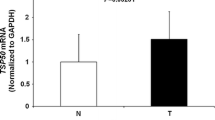Abstract
Testes-specific protease 50 is a newly reported threonine enzyme. It has similar amino acid sequences and enzymatic structures to some other serine proteases. It is proposed as a laryngocarcinoma-related gene in human beings. The physiological mechanism by which TSP50 exerts its promoting effects in laryngocarcinoma is not yet fully understood. The study investigated the function of TSP50 by suppressing its expression in the HEp2 cell line using a TSP50-specific short hairpin RNA (shRNA). Western bloting and real-time-PCR were used to detect the levels of TSP50. By using MTT, Wound healing, flow cytometric and tumorigenesis assays, the study tested the TSP50 role in human laryngocarcinoma cell growth and apoptosis. The results demonstrated that TSP50 knockdown could inhibit HEp2 cell proliferation and induce apoptosis in vitro in a NF-κB-mediated pathway. The tumorigenicity of TSP50 shRNA-expressing cells were decreased after inoculating into nude mice. The present results provide a new understanding of the TSP50 gene in the progression of laryngocarcinoma and put up a novel therapeutic target for treating this cancer.



Similar content being viewed by others
References
Yuan L, Shan J, De Risi D, Broome J, Lovecchio J, Gal D, Vinciguerra V, Xu HP (1999) Isolation of a novel gene, TSP50, by a hypomethylated DNA fragment in human breast cancer. Cancer Res 59:3215–3221
Shan J, Yuan L, Xiao Q, Chiorazzi N, Budman D, Teichberg S, Xu HP (2002) TSP50, a possible protease in human testes, is activated in breast cancer epithelial cells. Cancer Res 62:290–294
Li YY, Bao YL, Song ZB, Sun LG, Wu P, Zhang Y, Fan C, Huang YX, Wu Y, Yu CL, Sun Y, Zheng LH, Wang GN, Li YX (2012) The threonine proteaseactivity of testes-specific protease 50 (TSP50) is essential for its function in cellproliferation. PLoS ONE 7(5):e35030
Xu H, Shan J, Jurukovski V, Yuan L, Li J, Tian K (2007) TSP50 encodes a testisspecific protease and is negatively regulated by p53. Cancer Res 67:1239–1245
Chu EA, Kim YJ (2008) Laryngeal cancer: diagnosis and preoperative work-up. Otolaryngol Clin North Am 41:673–695
Siegel R, Ward E, Brawley O, Jemal A (2011) Cancer statistics, 2011: the impact of eliminating socioeconomic and racial disparities on premature cancer deaths. CA Cancer J Clin 61:212–236
Parker SL, Tong T, Bolden S, Wingo PA (1997) Cancer statistics, 1997. CA Cancer J Clin 47:5–27
Zhou L, Bao YL, Zhang Y, Wu Y, Yu CL, Huang YX, Sun Y, Zheng LH, Li YX (2010) Knockdown of TSP50 inhibits cell proliferation and induces apoptosis in P19 cells. IUBMB Life 62:25–32
Martins VR, Dias MS, Hainaut P (2013) Tumor-cell-derived microvesicles as carriers of molecular information in cancer. Curr Opin Oncol 25:66–75
Ambros V (2003) MicroRNA pathways in flies and worms: growth, death, fat, stress, and timing. Cell 113:673–676
Garzon R, Calin GA, Croce CM (2009) MicroRNAs in cancer. Annu Rev Med 60:167–179
Song ZB, Bao YL, Zhang Y, Mi XG, Wu P, Wu Y, Yu CL, Sun Y, Zheng LH, Huang YX, Liu B, Li YX (2011) Testes-specific protease 50 (TSP50) promotes cell proliferation through the activation of the NF-kappa beta (NF-kappaB) signaling pathway. Biochem J 436:457–467
DiDonato J, Mercurio F, Rosette C, Wu-Li J, Suyang H, Ghosh S, Karin M (1996) Mapping of the inducible IκB phosphorylation sites that signal its ubiquitination and degradation. Mol Cell Biol 16:1295–1304
Zheng C, Yin Q, Wu H (2011) Structural studies of NF-kappaB signaling. Cell Res 21:183–195
Greten FR, Eckmann L, Greten TF, Park JM, Li ZW, Egan LJ, Kagnoff MF, Karin M (2004) IKKbeta links inflammation and tumorigenesis in a mouse model of colitis-associated cancer. Cell 118:285–296
Nelsen B, Hellman L, Sen R (1988) The NF-kappa B-binding site mediates phorbol ester-inducible transcription in nonlymphoid cells. Mol Cell Biol 8:3526–3531
Hayden MS, Ghosh S (2008) Shared principles in NF-kappaB signaling. Cell 132:344–362
Iannolo G, Conticello C, Memeo L, De Maria R (2008) Apoptosis in normal and cancer stem cells. Crit Rev Oncol Hematol 66:42–51
Karin M, Greten FR (2005) NF-kappaB: linking inflammation and immunity to cancer development and progression. Nat Rev Immunol 5:749–759
Hirsch T, Marzo I, Kroemer G (1997) Role of the Mitochondrial Permeability Transition Pore in Apoptosis. Biosci Rep 17:67–76
Yin XM (2000) Signal transduction mediated by Bid, a pro-death Bcl-2 family proteins, connects the death receptor and mitochondria apoptosis pathways. Cell Res 10:161–167
Mohamad N, Gutierrez A, Nunez M, Cocca C, Martín G, Cricco G, Medina V, Rivera El, Bergoc R (2005) Mitochondrial apoptotic pathways. Biocell 29:149–161
Author information
Authors and Affiliations
Corresponding author
Rights and permissions
About this article
Cite this article
Liu, Yl., Sun, Yn. Down-regulation of testes-specific protease 50 induces apoptosis in human laryngocarcinoma HEp2 cells in a NF-κB-mediated pathway. Mol Biol Rep 41, 7743–7747 (2014). https://doi.org/10.1007/s11033-014-3634-3
Received:
Accepted:
Published:
Issue Date:
DOI: https://doi.org/10.1007/s11033-014-3634-3




